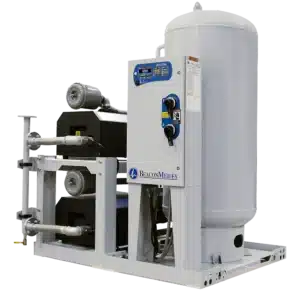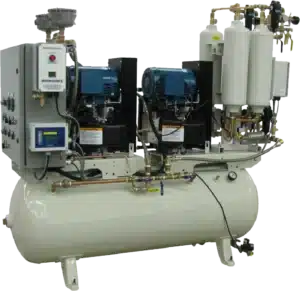Medical gases are vital for the optimal functioning of hospitals. Besides patient treatment, they are used in a multitude of medical operations ranging from powering specialized medical tools, cleaning, to suctioning wastes. While oxygen is the most popular and ubiquitous of medical gases, there are several others that are used in hospitals depending on the scale and range of their facilities. This article will present five of the most common medical gases used in hospitals along with their uses.
1. Oxygen
Oxygen is used in most hospitals. It is administered to patients that require supplemental oxygenation as a result of insufficient oxygen in the blood in cases such as hypoxemia and hypoxia. In big hospitals with high patient capacity, the gas is usually stored in a large storage system in the form of liquid oxygen which is evaporated into a concentrated oxygen for supply. The pressure for the storage system is generally kept at around 380 kPa or 55 psi for optimal supply flow. This storage arrangement is referred to as a vacuum insulated evaporator or VIE. In smaller hospitals, the gas is supplied using standard oxygen cylinders.
2. Nitrogen
Nitrogen has multiple uses. In hospitals, it is used to power up surgical equipment during various medical procedures in the absence of instrument air. It is also used for measuring people’s responses to simulated aircraft cabin environments in preflight lung testing. In dermatology and cryosurgery, the gas is also used as a crygon to either freeze and preserve different biological specimens such as blood and tissues, or freeze and destroy diseased tissues.
3. Nitrous Oxide
Nitrous Oxide is a variant of nitrogen (nitrogen mixed with oxygen), and is what is known as “laughing gas’. It is used as an analgesic, as well as an anesthetic in numerous preoperative medical procedures. There are certain cases where the gas is contraindicated. For such types of procedures, patients are given a medical gas warning wristband that alerts doctors and staff not to administer it. The gas is generally delivered to hospitals in tanks and supplied through the medical gas system at around 345 kPa, or 50 psi.
4. Carbon Dioxide
Carbon dioxide is another important medical gas that has a multitude of uses. It is used for insufflating patients, a medical procedure in which the gas is blown into the body cavity of a patient for enlargement and increased stability to create better access and visibility to surgical areas. The gas can provide respiratory stimulation to patients when mixed with oxygen, and is used during and after administration of anesthesia. In cryotherapy, it can also be used to destroy body cells through the process of crystallization at temperatures of -76℃. System pressures for carbon dioxide storages are maintained at about 345 kPa, or 50 psi.
5. Medical Air
Medical air refers to a supply of clean and compressed air used in a range of operations in hospitals. It is completely free of contaminants and particles, has no oil or smell. It also has zero moisture content to prevent water buildup in the facility pipeline. Medical air is pressurized to around 380 kPa, or 55 psi.
Conclusion
Medical gases are used in various medical procedures that are performed to treat patients. Some are directly administered to patients while others provide essential functions indirectly. For hospitals, regular and timely medical gas maintenance services are very important to keep their medical gas supply running flawlessly.
If you’re looking for a medical gas maintenance company to give your medical gas system a reliable and thorough professional service, contact Medical Testing Solutions.


